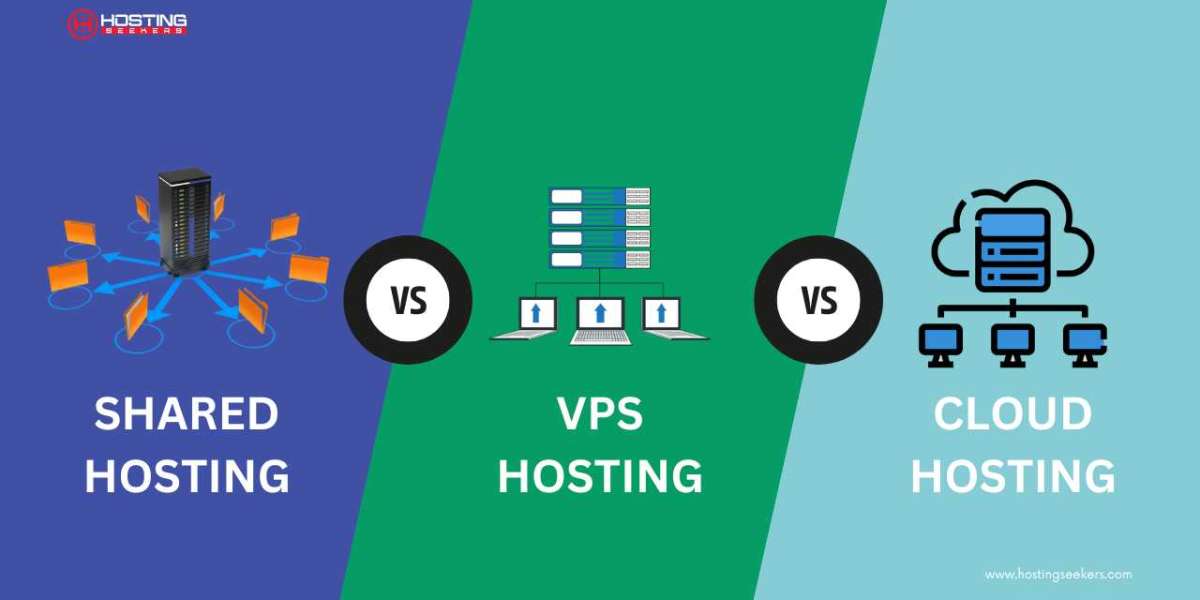When it comes to web hosting, there are various options available. Three popular choices are shared hosting, VPS hosting, and cloud hosting. Each of these hosting options has its unique features, advantages, and disadvantages. In this article, we will compare and contrast shared hosting, VPS hosting, and cloud hosting.
What is Shared Hosting?
Shared hosting is one of the most popular types of web hosting services available on the internet. It is used by individuals and small businesses who are looking for a cost-effective and easy-to-use solution for hosting their websites. Best shared server hosting allows multiple websites to share a single physical server and its resources, such as CPU, RAM, and storage space. In this article, we will explore the benefits and drawbacks of shared hosting to help you decide if it's the right choice for your website.
Benefits of Shared Hosting
Cost-effective
One of the most significant benefits of shared hosting is its cost-effectiveness. Since multiple websites share the same server, the cost of the server is divided among all the users. This makes shared hosting a much more affordable option compared to other types of hosting services.
Easy to use
Shared hosting is also easy to use, as the hosting provider takes care of most of the technical aspects of website management, such as server maintenance, security updates, and software installations. This means that even people with little technical knowledge can set up and manage their websites with ease.
Scalability
Shared hosting providers often offer scalable plans that allow users to upgrade their resources as their website grows. This means that you can start with a basic plan and upgrade to a higher-tier plan as your website traffic increases.
Technical Support
Most shared hosting providers offer technical support to their users. This means that you can get help if you run into any issues with your website or hosting service. Technical support is usually available 24/7 via phone, email, or live chat.
Customization
While shared hosting may have certain limitations, it still offers a certain level of customization. You can install different content management systems (CMS) like WordPress or Joomla and customize your website's design and functionality to meet your specific needs.
Drawbacks of Shared Hosting
Limited Resources
One of the main drawbacks of shared hosting is that resources are shared among all the websites hosted on the same server. This means that if one website receives a sudden spike in traffic, it can affect the performance of other websites hosted on the same server.
Lack of Control
With shared hosting, you have limited control over the server and its resources. You cannot install custom software or make changes to the server configuration, as these changes would affect all the websites hosted on the same server.
Security Risks
Shared hosting can be less secure than other types of hosting services, as multiple websites share the same server and its resources. If one website on the server gets hacked or infected with malware, it can potentially affect all the other websites hosted on the same server.
Performance Issues
If your website receives a lot of traffic or has high resource demands, shared hosting may not be the best option. Since resources are shared among all the websites on the same server, your website's performance may suffer if other websites on the server are using too many resources.
Lack of Customization
While shared hosting does offer some level of customization, it still has certain limitations. You may not be able to install custom software or configure the server to meet your specific needs.
Shared hosting can be a great option for individuals and small businesses who are looking for a cost-effective and easy-to-use solution for hosting their websites. It offers scalability, technical support, and a certain level of customization. However, shared hosting plans also have certain drawbacks, such as limited resources, lack of control, security risks, performance issues, and limited customization.
What is VPS Hosting?
VPS hosting is a type of hosting that utilizes virtualization technology to create a private server environment on a shared server. With the best VPS hosting, a physical server is divided into multiple virtual private servers, each with its operating system, dedicated resources, and full root access. This means that each VPS has complete control over its hosting environment and can install and run the software, manage configurations, and access files and data independently of other VPSs on the same server.
Benefits of VPS Hosting
Cost-effective
VPS hosting services are a cost-effective solution that provides you with a dedicated hosting environment without the high costs associated with dedicated servers. Because VPS hosting shares server resources, the hosting company can offer VPS hosting at a lower cost than a dedicated server.
Scalability
VPS hosting is highly scalable and allows you to increase or decrease resources based on your website's needs. As your website grows, you can easily upgrade your VPS plan to accommodate the increased traffic and resource requirements.
Control and Customization
With VPS hosting, you have complete control over your hosting environment. You have full root access to your VPS, allowing you to install and configure any software or application that your website requires. This level of control and customization is not possible with shared hosting.
Security
VPS hosting provides a high level of security, as each VPS is isolated from other VPSs on the same server. This means that even if one VPS is compromised, the other VPSs on the server remains secure. Additionally, VPS hosting providers typically offer a range of security features, such as firewalls, intrusion detection, and regular security updates.
Reliability
VPS hosting is highly reliable, as each VPS has its resources and is isolated from other VPSs on the server. This means that the performance of one VPS does not affect the performance of other VPSs on the same server. Additionally, VPS hosting providers typically offer uptime guarantees, ensuring that your website remains accessible to visitors.
Drawbacks of VPS Hosting
Technical Knowledge
VPS hosting requires a certain level of technical knowledge to set up and manage. While the hosting provider may offer some support, you are responsible for managing your VPS, including installing and configuring software, managing security, and performing backups.
Resource Limitations
While VPS hosting provides dedicated resources, these resources are still limited by the physical server's resources. This means that if you exceed your VPS's allocated resources, your website's performance may suffer.
Costs
While VPS hosting is more cost-effective than dedicated hosting, it is more expensive than shared hosting. Additionally, some VPS hosting providers may charge additional fees for features such as backups, security, and support.
Server Maintenance
VPS hosting providers are responsible for maintaining the physical server, including hardware maintenance, network connectivity, and server updates. However, you are responsible for maintaining your VPS, including software updates, security patches, and backups.
What is Cloud Hosting?
Cloud server hosting is a type of web hosting that uses virtual servers to store and access data over the internet. Instead of relying on a physical server that is located on-site, cloud hosting services use a network of interconnected virtual servers that can be accessed from anywhere in the world. This means that businesses can store and access their data and applications on the cloud, without needing to maintain and manage their own hardware.
The virtual servers used in cloud hosting are typically housed in data centers, which are large facilities that are designed to store and manage computer hardware. These data centers are equipped with redundant power and cooling systems, as well as multiple internet connections, to ensure maximum uptime and reliability. Cloud hosting providers typically offer a range of plans to suit different business needs, and can provide features such as automatic scaling, load balancing, and security measures to ensure the best possible service.
Benefits of Cloud Hosting
Scalability
One of the biggest benefits of cloud hosting services is their scalability. Traditional hosting methods often require businesses to purchase or lease physical servers that have a fixed amount of processing power and storage capacity. This means that if a business needs to increase its server capacity, they need to purchase new hardware, which can be expensive and time-consuming.
With cloud hosting, businesses can easily scale their resources up or down depending on their needs. Cloud hosting providers typically offer flexible plans that allow businesses to increase or decrease their server resources as needed, without having to worry about purchasing or maintaining their own hardware. This means that businesses can easily accommodate spikes in traffic or seasonal fluctuations in demand, without having to worry about their servers becoming overloaded.
Cost Savings
Cloud hosting can also offer significant cost savings compared to traditional hosting methods. By using virtual servers instead of physical servers, businesses can avoid the costs associated with purchasing and maintaining their own hardware. Cloud hosting providers also typically offer pay-as-you-go plans, which means that businesses only pay for the resources that they actually use. This can be a more cost-effective option than traditional hosting plans, which often require businesses to pay for a fixed amount of server capacity, regardless of whether they use it all.
In addition to cost savings on hardware and infrastructure, cloud hosting can also help businesses save money on IT staff and maintenance. Because cloud hosting providers handle the maintenance and management of virtual servers, businesses do not need to have dedicated IT staff to manage their servers. This can be especially beneficial for small businesses that may not have the resources to hire dedicated IT staff.
High Availability
Cloud hosting can also offer high levels of availability and uptime. Because cloud hosting providers typically use redundant hardware and multiple internet connections, they can ensure that their virtual servers are always available and accessible. This means that businesses can enjoy high levels of uptime, even during periods of heavy traffic or system maintenance.
Cloud hosting providers also typically offer automatic failover and load-balancing capabilities. This means that if one server goes down or becomes overloaded, the workload can be automatically shifted to another server in the network, ensuring that there is no interruption in service.
Flexibility
Cloud hosting also offers a high degree of flexibility. Businesses can choose from a range of plans and features to suit their specific needs, and can easily scale their resources up or down as needed. Cloud hosting providers also typically offer a range of tools and features to help businesses manage their virtual servers, including monitoring and analytics tools, backup and recovery options, and security measures.
Conclusion
Understanding the difference between shared hosting, VPS hosting, and cloud hosting is crucial for anyone looking to establish an online presence. Shared hosting is an excellent choice for beginners with a tight budget, while VPS hosting offers more control and resources for those with a growing website. Cloud hosting, on the other hand, provides exceptional scalability, security, and reliability, making it the perfect choice for businesses that require high-performance web hosting. When selecting a hosting plan, it's essential to consider your needs, budget, and future goals. By doing so, you can choose a hosting solution that meets your requirements and helps you achieve your online objectives.



